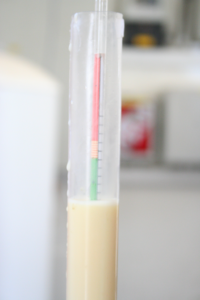Calf Care
Care of newborn calves can have a lasting impact on their future productivity. Newborns should receive 10% of their body weight of high-quality colostrum (>50 mg/ml of antibody) within no more than 4 hours of birth. Testing the quality of colostrum is vital to ensuring that what you are feeding is rich in antibodies to provide the calf with sufficient antibodies to prevent infections. Testing is simple and can be done within minutes using colostrometer.
Keeping calves hydrated and in warm, clean conditions will help ensure that they are given the best start. Fresh water, hay and calf creep feed should be offered daily alongside any milk feed. This encourages rumen development and growth, which improves live weight gains and reduces stress at weaning. Good ventilation in a calf house is critical to ensuring calves remain healthy.
Good ventilation will keep a fresh airflow which reduces pathogens and helps to keep bedding materials dry – reducing bedding material costs and more importantly keeping the pathogen levels down. In colder weather, the use of calf jackets and providing an increase in milk feed offered will ensure that the calf can use all of the nutrition to remain healthy and growing.
Find out more:
Getting calves off to a good start - Woodhead Farming For a Better Climate meeting notes
Video: Calf care in cold weather
Video: Calf scour prevention
Technical Note TN681: Nutritional management of artificially reared calves

Sign up to the FAS newsletter
Receive updates on news, events and publications from Scotland’s Farm Advisory Service
